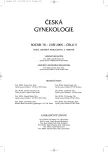Antifungal Effect in Selected Natural Compounds and Probiotics and their Possible Use in Prophylaxis of Vulvovaginitis
Antifungální účinek u vybraných přírodních látek a probiotik, jejich možnosti použití v profylaxi vulvovaginitidy
Cíl studie:
Přehled účinných přírodních látek a probiotik s antifungální aktivitou a jejich možné použití u vulvovaginitid jako profylaktika či terapeutika.
Typ studie:
Literární přehled.
Název a sídlo pracoviště:
Univerzita Karlova v Praze, Farmaceutická fakulta v Hradci Králové.
Metodika:
Rešerše studií a publikací z medicínských databází.
Závěr:
U některých přírodních látek byl prokázán antimykotický účinek. Účinnost česnekového extraktu za podmínek in vitro vůči kvasinkám rodu C. albicans se projevuje do jedné hodiny. Značnou antifungální aktivitu vůči C. albicans vykazují i esenciální oleje obsažené v kayenském pepři (Capsicum frutescens).
Hřebíček vykazuje menší antimykotické účinky. Čínský pórek vykazuje podobné účinky jako česnek. Rovněž propolis vykazuje antifungální vlastnosti, kde citlivost kmenů kvasinek klesá v tomto pořadí: C. albicans > C. tropicalic > C. crusei > C. guilliermondii. Jeho účinnost je závislá na složení a místo původu. Tea trea olej (Melaleuca alternifolia) působí inhibičně na kmeny rodu Candida v minimální inhibiční koncentraci, pouze u C. crusei a C. norvengensis je zapotřebí koncentrace vyšší. V profylaxi vaginálních kandidóz lze doporučit perorální podávání kmenů Lactobacillus rhamnosus GR-1 a L. fermentum RC-14, B-54. Dále se jeví vhodné kmeny L. brevis CD-2, L. salivarius FV-2, L. gasseri MB 335, L. plantarum, a to v podobě gelových kapslí (L. plantarum) či vaginálních tablet (L. gasseri). Kmeny L. acidophilus CRL 1294 a L. salivarius CRL 1328 vykazují schopnost samoagregace a koagregace s Candidou.
Upozornit je nutné na to, že probiotické kmeny lactobacilla (zejména L. casei a L. rhamnosus) mohou ve vzácných případech vyvolat bakteriémii a sepsi, a to zejména u imunodeficientních pacientek a pacientek, které prodělaly chirurgický zákrok trávicího ústrojí. U vitamínu E nebyl prokázán ochranný účinek proti kvasinkové infekci, pozitivní vliv nebyl jednoznačně potvrzen ani u zinku, nicméně normalizaci jeho hladiny lze doporučit.
Klíčová slova:
vulvovaginitis, antifungální účinek, přírodní látky, probiotika, zinek
Authors:
M. Hronek; D. Vachtlová; Z. Kudláčková; P. Jílek
Authors‘ workplace:
Katedra biologických a lékařských věd Farmaceutické fakulty v Hradci Králové, LF UK, Praha, vedoucí
pracoviště doc. RNDr. V. Semecký, CSc.
Published in:
Ceska Gynekol 2005; 70(5): 395-399
Category:
Retraining
Overview
Objective:
a survey of effective natural compounds and probiotics with antifungal activity and their possible use in vulvovaginitis as a prophylactic or therapeutic drug.
Design:
review of literature.
Setting:
Charles University at Prague, Pharmaceutical Faculty at Hradec Králové.
Methods:
and review of literature and publications from medical data-bases.
Conclusions:
certain natural compounds were proved to exert antimycotic effects. The efficiency of garlic
extract under in vitro conditions against yeast of C. albicans family becomes manifest within one hour. Essential oils present in the Cayenne pepper (Capsodum frutescens) exert considerable antifungal activity against C. albicans as well. Clove exerts lower antimycotic effects. The effects of Chinese leek are similar to garlic. Propolis also possesses antifungal properties, and sensitivity of the yeast strains decreases in the following order: C. albicans > C. tropicalis > C. crusei > C. guilliermondii. Its efficiency depends on the composition and place of origin. Tea trea oil (Melalauca alternifolia) is inhibiting strains of Candida family (genus) in minimal inhibiting concentration, higher concentrations are necessary for C. crusei and C. norvengensis. In the prophylaxis of vaginal candidoses, oral administration of the strains of Lactobacilus rhamnosus GR-1 and L. fermentum RC-14, B-54 may be recommended. Moreover there are suitable strains of L. brevis CD-2, L. salivarius FV-2, L. gasseri MB 335, L. plantarum, useful in the form of gel capsules (L. plantarum) or vaginal tablets (L. gasseri). The strains of L. acidophilus CRL 1294 and L. salivarius CRL 1328 display the capacity of self aggregation and co-aggregation with Candida. It should be pointed out that the probiotic strain of Lactobacillus (especially L. casei and L. rhamnosus) may, in exceptional cases, cause bacteriemia and sepsis, especially in immunodeficient patients and those who underwent surgery of alimentary tract. No protective effect against yeast infection was detected with vitamin E, any positive effect was not unequivocally confirmed with zinc, but adjusting zinc levels to normal may be recommended.
Key words:
vulvovaginitis, antifugal effects, natural compounds, probiotics, zinc
Labels
Paediatric gynaecology Gynaecology and obstetrics Reproduction medicineArticle was published in
Czech Gynaecology

2005 Issue 5
Most read in this issue
- The Perineal Body Length and Injury at Delivery
- Embolization of Uterine Arteries during Myoma Treatment from the Patient’s Point of View
- Antifungal Effect in Selected Natural Compounds and Probiotics and their Possible Use in Prophylaxis of Vulvovaginitis
- Does Oocyte Retrieval Influence the Following Morphological Quality of Embryos?
